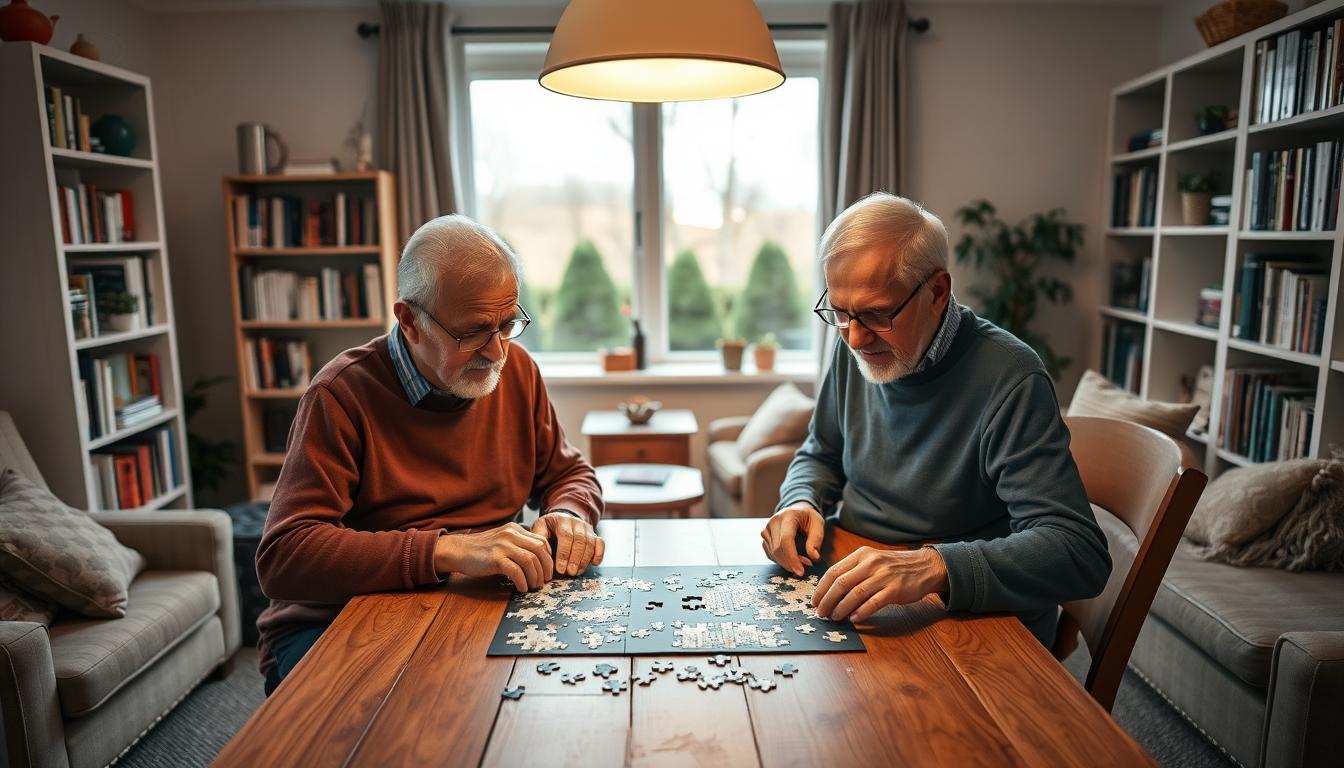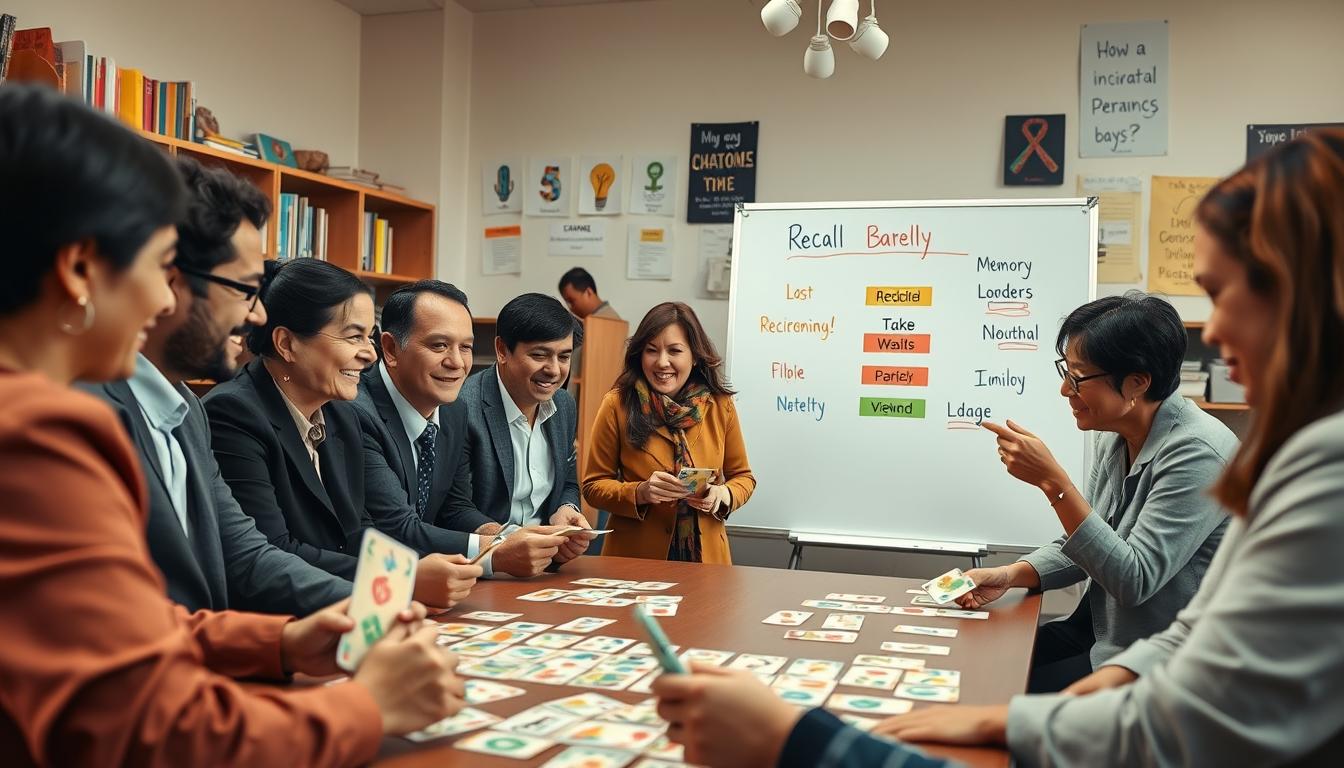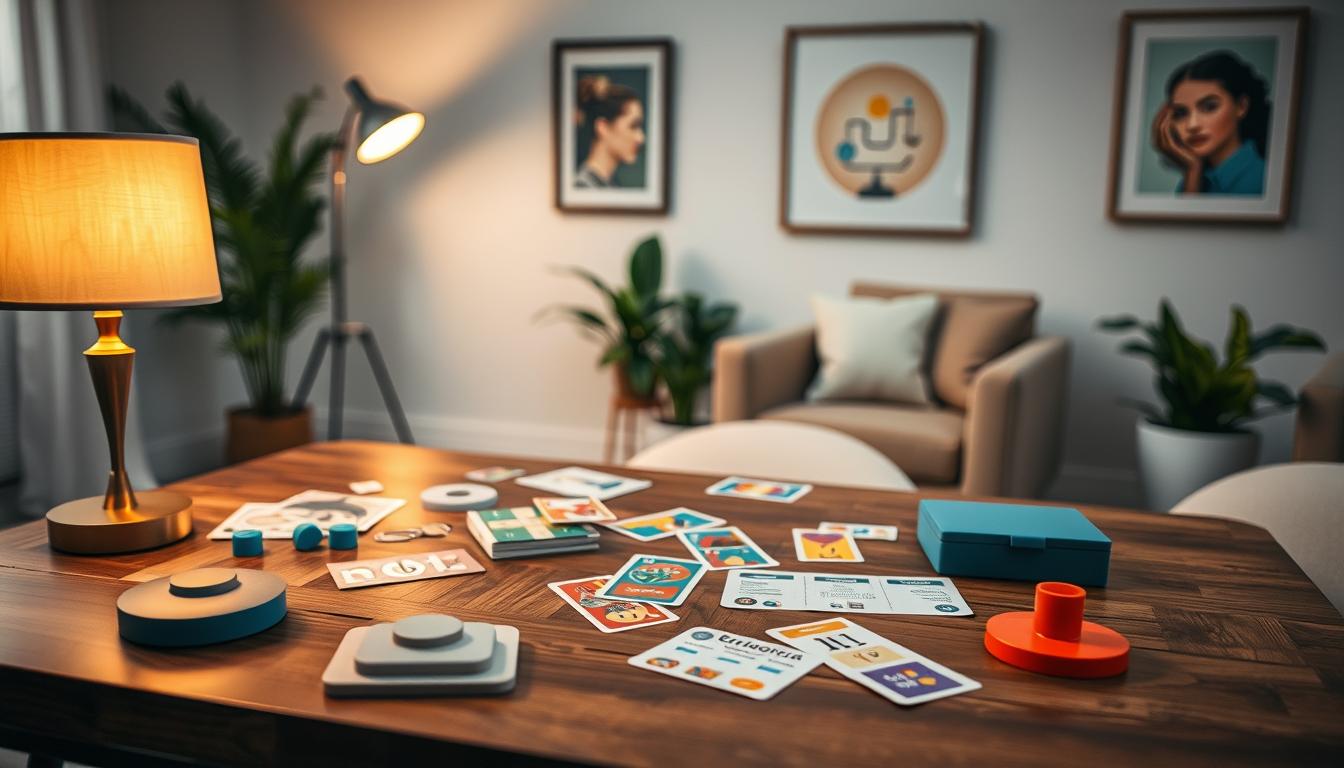Educational games that stimulate short-term memory in active seniors
What if the secret to better memory as you age is simple fun? Educational games for seniors are changing how we view brain health, especially for short-term memory. Playing brain games is more than just a hobby. It’s a way to keep your mind sharp and your spirit high.
Studies show that these games are not only fun but also boost focus and memory. In a world where keeping your mind sharp is key, finding the right games can be a game-changer. Could a simple game be your memory’s best friend?
Importance of Mental Stimulation for Seniors
Mental stimulation is key for seniors’ cognitive health. It fights off cognitive decline and lowers dementia risk. It also makes neural connections stronger, keeping the mind sharp and clear.
These activities boost cognitive function and mood. They also reduce loneliness. Seniors feel more independent and solve problems better when they play games and challenges.
Keeping the brain active is like physical exercise for the mind. A stimulated mind leads to a better life. Caregivers and family members can improve seniors’ mental health through brain exercises. This makes their daily life and interactions more enjoyable.
Overview of Short-Term Memory in Seniors
Short-term memory in seniors starts to fade as they get older. This memory helps keep information for a short time. It’s key for daily tasks and keeping independence.
It’s hard for seniors to remember recent things or talks. This leads to feeling stuck and confused.
Spotting early signs of memory loss is important. It helps families and caregivers offer the right support. Playing memory games can help seniors remember better. These games are important for keeping up with daily tasks.

As more people get older, knowing about short-term memory is key. It helps tackle memory problems and gives seniors ways to improve their memory. A mentally stimulating environment can really help fight memory loss.
Benefits of Playing Educational Games
Playing educational games is great for seniors’ brains. These games boost thinking skills and help with mental health. They make players better at solving problems and thinking critically.
Games like crossword puzzles and Sudoku do more than just entertain. They help seniors meet new people and feel better emotionally. This can fight off loneliness and isolation.
These games also help improve memory. They make the brain work harder, creating new connections. This slows down brain aging and makes seniors feel proud of their achievements.
In short, educational games are a win-win. They keep seniors’ minds sharp and help them connect with others. It’s a fun way to stay mentally fit and socially active.
Types of Educational Games for Seniors
There are many ways to keep seniors engaged, from brain games to fun activities. Word puzzles, number games, board games, and memory games are all great choices. Each one offers a unique challenge that suits different tastes.
Word puzzles like crosswords and word searches help improve vocabulary and memory. They’re not just fun; they also bring people together. Number games, such as Sudoku, boost logical thinking and are enjoyable.
Board games foster teamwork and strategy, making them perfect for socializing. Memory games sharpen the mind and are great for staying mentally sharp. With so many options, it’s easy to find games that match a senior’s interests and abilities.
Word Puzzles and Their Cognitive Benefits
Word puzzles for seniors are a fun way to boost brain power. They offer entertainment and help keep the mind sharp. Research shows that word games are great for older adults, helping them stay mentally active.
Crossword Puzzles
Crossword puzzles are a favorite among many. They challenge players to fill in the blanks with the right words. This improves thinking, memory, and vocabulary.
Doing crosswords regularly can make seniors better at solving problems. It also helps them keep their minds sharp as they get older.
Word Searches
Word searches are both calming and mentally stimulating. Seniors find hidden words in a grid, improving their focus. This game boosts word recognition and overall brain health.
Playing word searches often keeps seniors mentally active. It’s a fun way to exercise the brain without feeling too much pressure.
Boggle and Hangman
Boggle and Hangman add a fun competitive edge to word games. In Boggle, players quickly make words from letters, enhancing quick thinking. Hangman, meanwhile, encourages guessing letters to reveal a word, improving strategy and vocabulary.
Both games are great for seniors. They promote critical thinking, vocabulary, and social interaction. Playing these games can be a fun way to keep the mind sharp.
| Type of Puzzle | Cognitive Benefit | Engagement Level |
|---|---|---|
| Crossword Puzzles | Improves critical thinking and memory | High |
| Word Searches | Enhances word retrieval skills | Moderate |
| Boggle | Promotes quick thinking and adaptability | High |
| Hangman | Encourages deduction and strategy | Moderate to High |
Number Games: Sudoku and More
Number games like Sudoku are fun for seniors. They help improve thinking skills and memory. Sudoku is especially good for the brain because it’s challenging.
Benefits of Sudoku for Logical Thinking
Sudoku boosts logical thinking. Players use numbers strategically. This practice sharpens problem-solving and memory.
Other Popular Number Puzzles
There are many puzzles like Sudoku. They keep the mind sharp and fun. For example:
- Kakuro: It’s like a number crossword. Players fill a grid with numbers that match sums.
- Futoshiki: This puzzle uses signs and grids. It helps seniors think clearly.
- KenKen: It’s like Sudoku but with math. It improves thinking and math skills.
These puzzles are great for keeping the mind active. They’re fun and good for the brain. Trying different puzzles can really help seniors stay sharp.
Board Games That Stimulate Memory
Board games are great for seniors to boost their brain power and have fun with friends. Many engaging board games for seniors challenge players to think strategically and remember things. Games like Scrabble and Pictionary help improve vocabulary and thinking skills, making them top memory-stimulating games.
The social benefits of board games make them even more appealing. Playing together helps seniors connect, laugh, and feel part of a community. This reduces loneliness and isolation that come with aging. Playing board games for cognitive function keeps minds sharp and strengthens friendships, making it a fulfilling activity.
| Game Title | Description | Benefits |
|---|---|---|
| Scrabble | A word game where players create words on a board. | Enhances vocabulary, spelling, and strategic thinking. |
| Sequence | A combination of poker and board game strategies. | Promotes cognitive planning and memory use. |
| Rummikub | A tile-based game combining elements of Rummy and Mahjong. | Encourages numerical and strategic thinking. |
| Memory | A classic card game focused on matching pairs. | Directly stimulates short-term memory and recall abilities. |
Choosing the right board games can bring joy and real benefits to seniors’ minds and hearts.
Brain Games for Seniors with Mild Memory Loss
Brain games for seniors with mild memory loss are key to improving their mental health. They help keep the mind sharp and active. These games are designed to tackle memory issues and make seniors feel more confident and calm.
Adding memory games to daily life boosts mental strength and pride. Seniors can enjoy puzzles, trivia, and memory games that match their interests. This makes them more eager to play and stay involved.
Moreover, these games can be a great way to meet new people. They encourage social interaction, helping seniors build stronger bonds. Whether played alone or with friends, these games can greatly improve a senior’s life.
Engaging Memory Games for Group Activities
Memory games for groups are great for seniors to improve their thinking skills. They also help build friendships. Games like the Tray Game and the Shopping List Game are perfect. They make players think hard and remember well.
Tray Game
The Tray Game is a fun way to test memory. A tray with different items is shown briefly to the group. Then, players try to remember as many items as they can. It’s a game that makes seniors think fast and enjoy friendly competition.
Shopping List Game
The Shopping List Game is all about teamwork and talking. Players add items to a list, remembering what came before. It’s a great way to keep memories sharp and have fun conversations. It’s perfect for seniors who love to chat and remember things.
Arts and Crafts as Brain Stimulators
Arts and crafts are great for keeping the brain active in seniors. These activities help seniors use their imagination and improve their motor skills. Every brush stroke or item made keeps the brain sharp, showing how creativity is good for the mind.
Doing crafts is more than just fun. Studies show it can make seniors feel less lonely and happier. Activities like painting, knitting, or woodworking give seniors a sense of pride and boost their mood.
Arts and crafts also help with problem-solving and thinking critically. These skills are important for staying mentally sharp as we get older. By being creative, seniors not only improve their thinking but also enjoy expressing themselves.
The Role of Technology in Memory Training
Technology is changing how we train our brains, especially for seniors. Now, there are many digital tools that help improve memory and thinking skills. Apps and games online make learning fun and effective.
Brain Training Apps
Apps like Lumosity and BrainHQ offer special exercises for the brain. They use technology to create tasks that fit your level. You can play games that help your brain stay sharp, like attention and memory games.
Online Memory Games
Online games are great for keeping your mind active. They’re fun and help you practice your brain skills. You can find games that test your memory in many ways, like matching games.
| Type | Examples | Benefits |
|---|---|---|
| Memory Training Apps | Lumosity, BrainHQ | Personalized exercises, progress tracking |
| Online Memory Games | Match Pairs, Memory Match | Engaging, variety of challenges |
| Social Interaction | Online Multiplayer Games | Enhances social connections |
Physical Games to Combine Mental and Physical Exercise
Playing physical games is key for seniors’ well-being. It mixes physical activity with mental challenges. This combo boosts brain function and keeps the body fit.
Games like dancing or playing catch are great. They make you remember rules, get better at coordination, and think fast. This improves your brain skills.
These games also help with emotional health. Activities like line dancing or team sports bring people together. They fight loneliness and strengthen friendships, boosting mental health.
| Game Type | Physical Benefits | Mental Benefits |
|---|---|---|
| Dancing | Improves cardiovascular fitness and flexibility | Enhances memory and mental agility |
| Chair Exercises | Promotes strength and stability | Boosts concentration and cognitive focus |
| Ball Toss Games | Improves hand-eye coordination and reflexes | Encourages quick thinking and spatial awareness |
Social Benefits of Playing Games
Playing games is a great way for seniors to connect with others. It helps them form strong bonds. When people play together, they talk more, which makes them feel less lonely.
These games are more than just fun. They help seniors feel part of a community. They enjoy being together and sharing experiences. This makes them want to join in more.
Games also help seniors think better. They improve memory and decision-making skills. This makes them want to keep playing and talking with others.
Games are not just for fun. They help seniors make friends and feel connected. They turn alone time into chances to meet new people. This makes games a key part of senior life.
Tips for Choosing the Right Game for Seniors
Choosing games for seniors needs careful thought. It’s important to think about their interests and how sharp their minds are. Games that match their skills and likes help them enjoy and get involved.
Start with games they know before moving to new ones. This way, they can get used to the games slowly. A regular gaming routine helps them look forward to these fun times.
Make sure games fit their abilities so they can play fully and feel important. Getting family or friends involved can make games even more fun.
Conclusion
Adding educational games to seniors’ daily lives is key for better thinking skills. This article showed how games help with memory, problem-solving, and social ties. They also boost overall happiness, which is great for the brain.
Playing games regularly is good for the mind and keeps seniors active. There are many types of games, like puzzles, board games, and apps. This means seniors can find fun ways to keep their minds sharp.
In the end, playing memory games has many benefits. It’s not just fun. It helps seniors stay mentally sharp and improves their life quality. Games are important for keeping the mind active as we get older.
FAQ
What are the cognitive benefits of educational games for seniors?
Games for seniors boost their brain power. They help keep memory sharp and mood high. These games also improve focus and mental health.
How do engaging games help combat cognitive decline?
Playing games keeps the brain active. This can lower the risk of dementia. It makes seniors feel more independent and happy.
What types of games are recommended for seniors to improve short-term memory?
Games like crosswords and Sudoku are great for memory. Board games also challenge the mind. They’re fun and help seniors connect with others.
Can arts and crafts benefit seniors’ cognitive functions?
Yes, arts and crafts boost creativity and motor skills. They also improve thinking. This leads to better mental health and less cognitive decline.
What role does technology play in memory training for seniors?
Technology, like Lumosity and BrainHQ, offers brain training. Online games make learning fun. They help seniors stay mentally sharp.
How can seniors maintain social connections while playing games?
Playing games with others helps seniors feel less lonely. It boosts their mood and emotional health. It also keeps their minds active.
What should I consider when choosing games for seniors?
Choose games that match their interests and abilities. Tailored games are more enjoyable. They offer better cognitive benefits.














